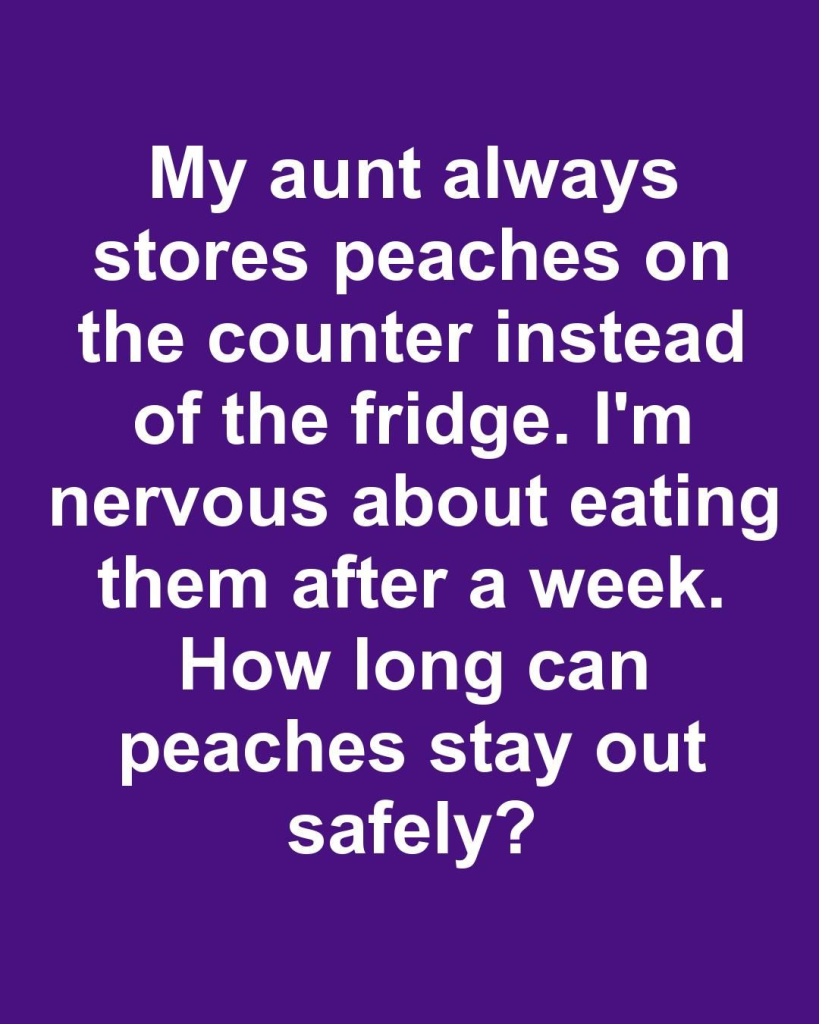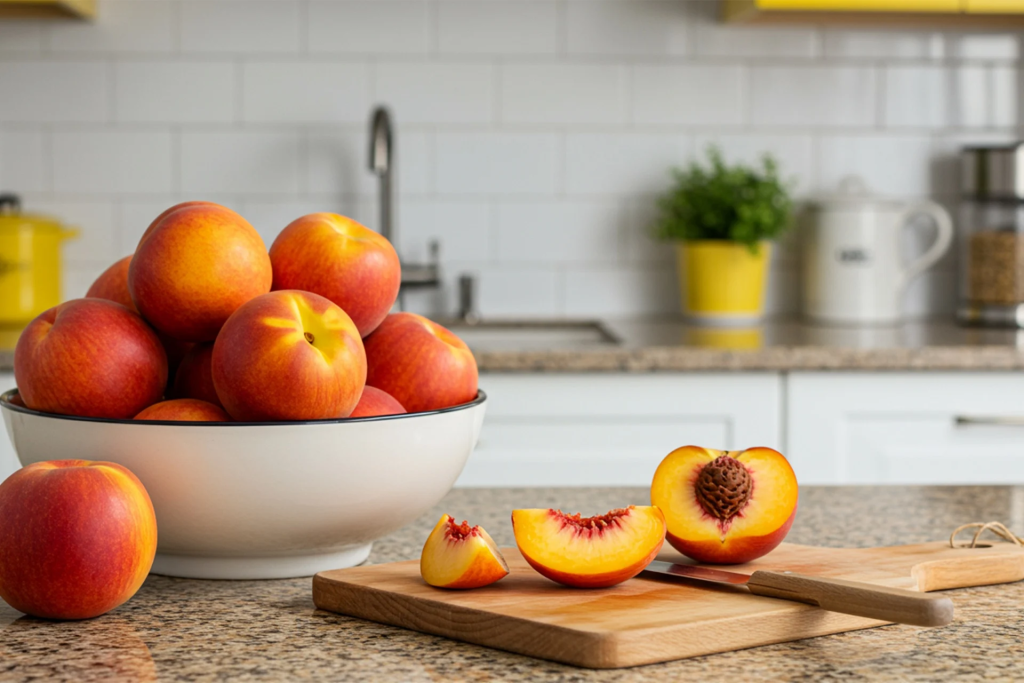There’s something about a perfectly ripe peach that screams summer—soft, fragrant, and dripping with sweet juice. But here’s the catch: keeping peaches at their prime isn’t as simple as tossing them in a bowl and forgetting about them. If you’re like my aunt, who always leaves peaches on the kitchen counter, you might wonder—how long is too long before they’re no longer safe to eat?
Let’s break down the science, the storage secrets, and the warning signs so you can enjoy every bite without a second thought.

Why Peaches Ripen on the Counter (and Not in the Cold)
Peaches are what we call climacteric fruits, which means they continue to ripen even after they’re picked. Once off the tree, they release ethylene gas—a natural compound that speeds up the ripening process. That’s why you often hear people say to leave peaches at room temperature if they’re still firm.
Cold temps (like your fridge) can stall this process. So when you refrigerate peaches too soon, you may end up with fruit that’s technically “ready,” but lacking in that juicy, sun-kissed flavor. Letting them ripen on the counter helps bring out their best—just don’t forget they’re there too long.
Video: How to store fresh peaches
So, How Long Can Peaches Stay on the Counter Safely?
Here’s the short answer: 3 to 4 days.
That’s the sweet spot for room-temperature ripening—if your home stays around 68-72°F (20-22°C). If it’s warmer, say during a summer heatwave, your peaches may soften and spoil even faster—sometimes in just 1 to 2 days.
Once they feel slightly soft to the touch and give off a fragrant, peachy aroma, that’s your cue: eat them, or move them to the fridge.
Warning Signs Your Peach Has Gone Too Far
Not all peaches age gracefully. Here’s what to look for when things go south:
- Mushy or leaking juice: Soft is good. Squishy and oozing? Not so much.
- Fuzzy mold: Usually appears around the stem or any bruised areas.
- Fermented smell: If it smells more like alcohol or vinegar than fruit, it’s past its prime.
- Discolored or shriveled skin: A sign of dehydration and internal spoilage.
When in doubt, toss it. No peach is worth a stomachache.
Is It Risky to Eat Overripe Peaches?

It can be. Overripe doesn’t automatically mean dangerous—but it does raise the risk. As peaches soften, they become more prone to bacterial growth. If left out too long or handled improperly, they could harbor harmful microbes like Salmonella or E. coli, especially if mold or bruising is present.
If a peach looks, smells, or feels off—don’t second-guess your gut. Trust it.
The Fridge Isn’t the Enemy (When You Use It Right)
Once your peaches hit peak ripeness, the fridge becomes your best friend. Stashing them in the cold slows down their decay and can extend their life by 3 to 5 days. Just make sure they’re in a breathable bag (a perforated plastic or paper bag works great) to avoid trapping moisture that can lead to mold.
Want to Speed Things Up? Try These Ripening Hacks
Need that peach ripe now? Here are a couple of viral-worthy tricks that actually work:
- The paper bag method: Place the peach in a brown paper bag, fold it shut, and leave it at room temp. It traps the ethylene gas and ripens the fruit faster.
- Add a banana: Toss a ripe banana in the bag to supercharge the process (bananas release a ton of ethylene).
- Wrap in a tea towel: Place peaches in a single layer on a tray, cover them with a towel, and let them ripen without direct sunlight.
Just don’t forget to check daily—these hacks do work fast.
Countertop vs. Fridge: Which Wins?
Video: Ask the Expert: How to Store Peaches | Cooking Light
Each method has pros and cons, and your choice depends on timing:
- Countertop storage is ideal for ripening and flavor development. The downside? It’s a race against time. Peaches can go from perfect to overripe in a blink.
- Refrigerator storage halts that ripening and helps preserve the fruit’s condition. But refrigerating too early can give you a dry, bland bite.
The best approach? Start on the counter, finish in the fridge.
Food Safety Tips for Enjoying Peaches Without Worry
Keep your fruit experience delicious and safe with these simple habits:
- Wash before eating: Rinse under cool water and gently rub the skin to remove dirt or pesticides.
- Handle with care: Peaches bruise easily—those spots are breeding grounds for bacteria.
- Store separately: Avoid crowding or stacking them; too much pressure = faster spoilage.
- Use your senses: Smell, touch, and visual cues will tell you more than a calendar ever could.
What Experts Say About Peach Storage
According to USDA guidelines, peaches should be stored at room temperature until ripe, then moved to the refrigerator to maintain freshness. Food safety specialists also recommend checking fruit daily during the ripening window—especially if your kitchen runs warm.
Most importantly, if you ever feel unsure, don’t eat it just because it “looks okay.” It’s better to be safe than sorry when it comes to perishable fruits.
Conclusion: Your Game Plan for Peach Storage Success

Peaches are delicate, delicious, and a little high-maintenance—but totally worth it. The key to keeping them safe and sweet is simple:
- Let them ripen fully on the counter (3–4 days max).
- Move them to the fridge once they’re soft and fragrant.
- Keep an eye out for spoilage, and trust your senses.
- Use viral hacks when you need to ripen fast, and always wash before eating.
So if you’re eyeing that peach your aunt left out for a week… it’s probably time to let it go.
Fresh, juicy peaches are a summer luxury—and now you know how to enjoy them without second-guessing every bite.


